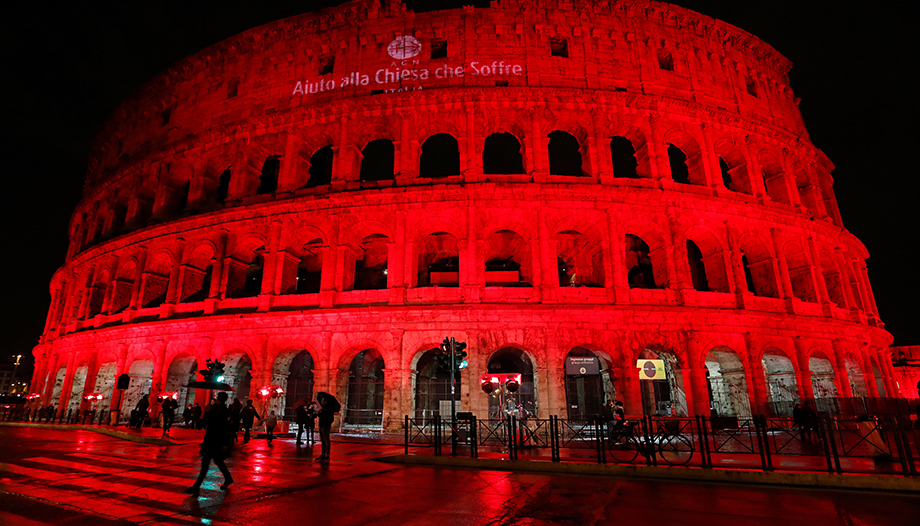It has been dubbed "Red Week": prayer meetings, testimonies and symbolic red lighting of buildings and landmarks in many cities. An initiative to raise awareness of the issue of religious freedom with special events in different countries. Like the one that took place in Brazil in 2015, with the red lighting of the Christ the Redeemer monument, in memory of the persecution of Christians in Iraq. Or in Italy in April 2016, at the initiative of the national office of Aid to the Church in Need, with the illumination of the Trevi Fountain in Rome.
It was then the office of ACN The initiative was replicated in the United Kingdom on a specific Wednesday in November, creating #RedWednesday, which was subsequently extended to a whole week in many countries. Even today, "Red Week" Wednesday, which in this sixth edition falls on November 23, will be the most hectic day.
Aid to the Church in Need is a pontifical foundation founded in 1947 and currently present in 23 countries with as many national offices. It carries out projects to support the pastoral care of the Church wherever it is persecuted, discriminated against or deprived of resources.
In 2020, it implemented more than 5,000 projects in 139 countries around the world. The Foundation has a threefold mission: to report on the daily reality of the suffering Church, to pray for persecuted Christians and to concretely help communities suffering from poverty and persecution.
This year, Aid to the Church in Need, in view of current energy saving regulations, has recommended that churches keep the red lighting on only for short periods of time or replace it with the ringing of bells. We learn this from an article published in L'Osservatore Romano on November 15, by Beatrice Guarrera.
In Australia, ten cathedrals will be lit red and a prayer vigil is planned at Canberra Cathedral. The UK is planning gatherings in both England and Scotland, including the "Taste of Home" initiative, which asks people to get together with friends and family. Sharing a traditional meal from countries where Christians are persecuted will be an opportunity to exchange stories about the suffering Church, pray and raise funds to support refugees.
The 2020-22 report on Christians persecuted for their faith, prepared by the acs office in the United Kingdom, is scheduled to be presented today and will subsequently be distributed in other countries. At the same time, a Mass will be celebrated in St. Charles Church in Vienna and initiatives are planned in some 94 churches in Austria.
In France, a round table on religious freedom and persecuted Christians will be held at the Collège des Bernardins in Paris, followed by an evening prayer vigil in Montmartre on November 23, with a testimony by the Nigerian Archbishop of Kaduna, Matthew Man-Oso Ndagoso. At the same time, the bells of a hundred churches across the country will ring out to publicize the initiative.
In Germany, meetings and testimonies are planned, such as those to be held in the cathedrals of Regensburg, Mainz and Augsburg, with guests from Iraq, Nigeria and Pakistan. A total of 60 German parishes have confirmed their participation in the "Red Week".
In Portugal, the awareness week will have an appendix on November 24, when the facades of many churches will be illuminated in red, with prayer meetings for the victims of religious persecution.
From Colombia to the Philippines, from Mexico to Canada: many other countries will mobilize to keep the spotlight on religious freedom under threat around the world.
Freedom of religion or belief is a "precious good". This definition, which first appeared in the landmark Kokkinakis case (1993), has become one of the standard citations in the jurisdiction of the European Court of Human Rights. What the international court emphasizes is that religious freedom, in addition to its obvious importance for followers of different religions, is indispensable for shaping respectful coexistence in a modern democracy. It is neither a luxury nor a privilege. To quote the Court, freedom of religion or belief is "one of the foundations of a democratic society".
Religious freedom is violated in nearly one-third of the world's countries, where approximately two-thirds of the world's population lives; 62 countries out of 196 have very serious violations of religious freedom. The number of people living in these countries exceeds 5 billion, and some of the world's most populous nations (China, India, Pakistan, Bangladesh and Nigeria) are among the worst offenders.
In recent years, however, important steps have been taken in the direction of interreligious dialogue, and religious leaders are playing an increasingly important role in the mediation and resolution of hostilities and conflicts. It is a challenge that cannot be ignored "in a world - these are the words of Pope Francis - in which different forms of modern tyranny seek to suppress religious freedom, or attempt to reduce it to a subculture without the right of expression in the public sphere, or even try to use religion as a pretext for hatred and brutality: it is up to the followers of different religious traditions to unite their voices to call for peace, tolerance and respect for the dignity and rights of others."








